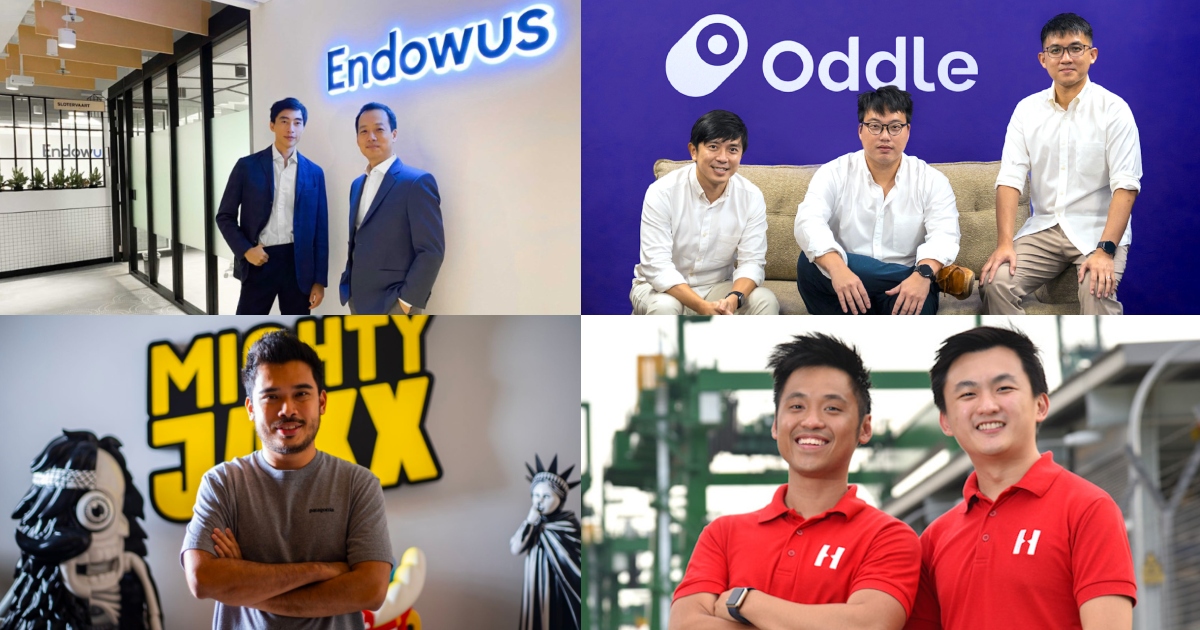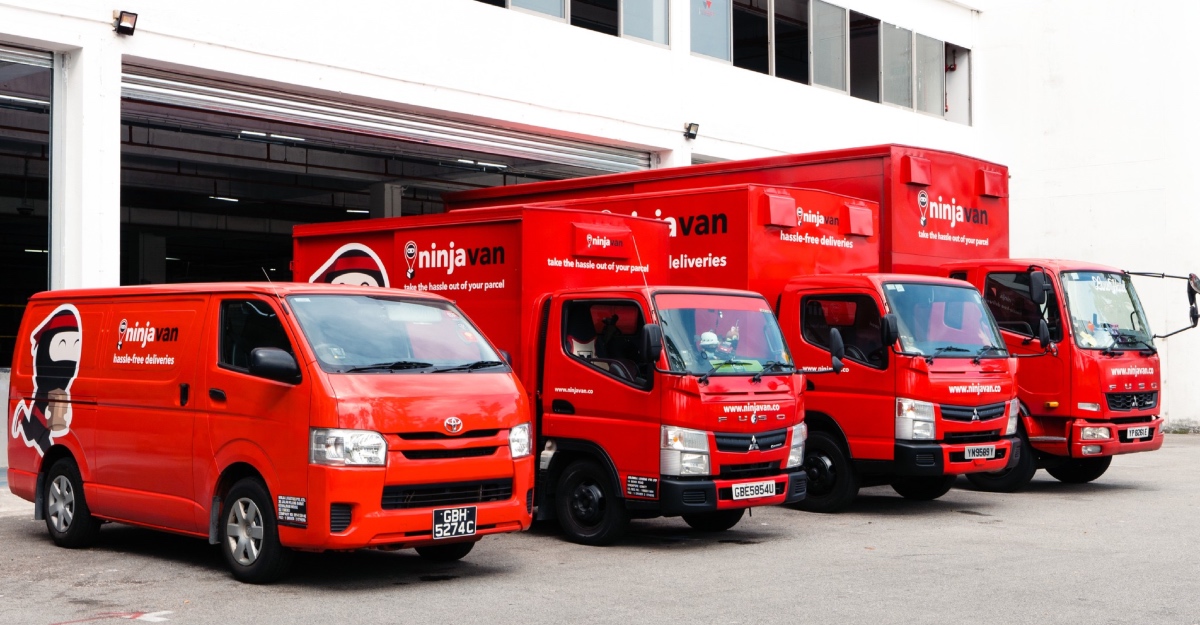While most businesses have recovered post-pandemic, this year’s economic conditions have definitely taken a toll on most businesses.
From the Russia-Ukraine war, to inflation and lockdowns in China, the economic outlook of this year has certainly been gloomy.
Despite that, many companies have held strong in the face of these market headwinds. In fact, some of them have even managed to expand their presence locally as well as overseas. Seeing strong growth and overcoming difficult times, we can expect these companies to continue their momentum in 2023.
Here’s a look at ten high growth startups that have seen successes during this tumultuous year.
1. Trust Bank

In September last year, Standard Chartered (StanChart) announced its partnership with the National Trades Union Congress (NTUC) to launch a digital-only bank. The digital bank, Trust Bank, was launched a year later, following the grant of a full banking license by the Monetary Authority of Singapore (MAS) in December 2020.
Powered by Amazon Web Services, the digital bank offers a range of products for its customers, comprising credit cards, savings accounts and family personal accident insurance.
As a newcomer to the banking industry, Trust Bank knew that it had to ramp up its offerings and provide incentives for people to switch from traditional banks to digital banks.
Hence, its offerings are combined with Link Rewards, a rewards and loyalty programme integrated with the FairPrice Group ecosystem which differentiates the digital bank’s offerings from traditional banks.
Through Link Rewards, its customers get to access best-in-market rewards on everyday spending at the FairPrice Group’s touchpoints across NTUC FairPrice, Kopitiam, Cheers and Unity. Besides that, the bank also offered very attractive incentives — such as giving away rice bags in the first month of its operations, and most recently, a Tesla.
These initiatives have proved to be enormously successful, with the bank seeing 100,000 customers joining in the first 13 days of its launch. In just two months, its user base grew to over 300,000 customers.
2. Oddle

Starting out as a food delivery platform back in 2014, Oddle pivoted into revenue sharing business model in 2019, and provides a one-stop platform that aids F&B owners digitise their businesses.
By combining empathy with technology, Oddle fills the gap in the market by providing low-cost, highly accessible performance-driven solutions that help F&B owners maximise their operations through smart data and meaningful engagement.
The company has adopted a “Always Restaurant First” philosophy, which differentiates itself from its competitors — its solutions give F&B merchants full control and transparency of their business and customer data, which ensures maximum yield at minimal costs.
Due to the pandemic, the platform saw an increase in traffic due to the spike in online deliveries. Most F&B merchants were also looking to digitise their businesses in order to stay afloat during that time.
The company’s Gross Merchandise Volume (GMV) has grown from S$30 million in 2019, to S$200 million in 2021. Their revenue has also increased over 17 times within the same period, and is now “capital-efficient”.
These figures have also remained strong for 2022, according to Oddle founder and CEO Jonathan Lim.
Earlier this year in May, Oddle bagged US$5 million in a pre-Series B funding round led by technology venture capital firm Altara Ventures. These funds are to be utilised to power product development and regional market expansion iacross Singapore, Malaysia, Taiwan and Hong Kong.
Most recently, Jonathan was named as one of the six winners of Ernst & Young’s EY Entrepreneur of the Year, which recognises those who are building and leading successful, growing and dynamic businesses.
3. Mighty Jaxx

Founder and CEO Jackson Aw’s love for designer art toys led to the birth of Mighty Jaxx in 2012, a homegrown toy collectibles startup. Established within the four walls of his bedroom, the startup had a meteoric rise and has partnered global brands such as F1, Warner Brothers, and Hasbro.
The company begun incorporating blockchain to authenticate the physical collectibles it produces back in 2019, and has recently made debut into the metaverse with its own interactive experience, MightyVerse Presents: Spooky Season.
In March, the company announced that it raised US$20 million in their Series A+ funding, bringing its total funding to US$34.8 million and pushing its valuation to over US$200 million.
The funding round was led by venture capital firm East Ventures, based in Jakarta, Indonesia. and will be used to fuel Mighty Jaxx’s expansion in Southeast Asia, as well as sharpen its immersive phygital experiences that integrate physical products with digital spaces and elements.
In addition, Mighty Jaxx plans to significantly expand its global workforce in the areas of tech, creative and licensing over the next 18 months. The company already has offices in London and Los Angeles, and is entrenched in Singapore and China.
Previously, in August 2021, the toy collectibles startup raised US$10 million in a Tencent-led funding round. Prior to this, Mighty Jaxx had raised a total of US$4.8 million in funding over three rounds, according to Crunchbase data.
Aside from this, in June this year, the company announced its acquisition of two companies in Singapore, Kinetiquettes and PLAYe, in a multimillion-dollar deal. Kinetiquettes, a statue collectible firm, will enable Mighty Jaxx to develop a new product category with newly-acquired intellectual property rights while PLAYe will enable Mighty Jaxx to tap into the company’s direct-to-consumer touchpoints and channels, and increase the visibility of Mighty Jaxx products to target audiences
4. Endowus

Founded in 2017, Endowus is Singapore’s first and only digital wealth advisor that helps people reach retirement goals and become more financially literate by offering various investing options for cash, Central Provident Fund (CPF) and Supplementary Retirement Scheme (SRS) funds.
Licensed by MAS, the digital wealth advisor received an investment of S$30 million from strategic investors UBS AG, Samsung Ventures and Singtel Innov8, along with their venture capital investors— Lightspeed Venture Partners and SoftBank Ventures Asia last year June.
Following the investment, and within 20 months of being licensed by MAS, the company crossed S$1 billion in assets under advice (AUA) in July 2021, making it the fastest-growing digital wealth platform in the country.
In addition, Endowus’ client assets grew by over 670 per cent in the last 12 months ending June 30 2021, despite COVID-19 induced market volatility. The number of clients investing on Endowus grew by almost 1,000 per cent in the same period.
Last November, it announced that it raised an additional S$35 million to accelerate its growth in Singapore and across Asia, bringing its total funding in 2021 to S$67 million.
The round was co-led by Prosus Ventures, the venture investing arm of Netherlands-listed Prosus, and Singapore-based global investor EDBI.
As of August this year, the company surpassed S$2 billion in AUA.
Most recently, Endowus acquired the majority stake in Carret Private Investments Limited, a leading Hong Kong-based wealth manager and multi-family office, to expand its presence in Hong Kong, in a bid to become one of the largest independent wealth managers in Asia.
5. EvCo

Earlier in April, the subsidiary of SMRT, Strides Mobility signed an agreement with China’s largest digital EV leasing player, DST (Shenzhen) to form a joint venture electric mobility service company called Strides DST Private Limited, or Strides-DST.
Under the brand EVCo, Strides-DST will work with partners in the ecosystem to lease electric vehicles to corporate clients with a full suite of EV services, including decarbonisation planning, operations planning, vehicle maintenance management, and digital solutions.
To be rolled out next year, EVCo announced the launch of Singapore’s largest ride-sharing programme for commercial vehicles a few weeks ago, targeted at SMEs and independent last-mile service providers.
Its fleet, called EV-Work, will help reduce carbon emissions produced in the process of parcel delivery to Singaporean households, and is also accessible in price to help independent delivery drivers retain more earnings.
For added convenience, EV-Work has also partnered P.Up, Singapore’s first on-demand mobile EV charging service, to charge and clean each EV vehicle overnight so that the vehicle is ready for use the next morning.
In addition, as many 20 EV-Work clusters have been planned islandwide, making it accessible for users to access EV-Work’s medium-sized light goods vans.
EV-Work aims to rollout a 2,000-strong fleet, 550 of which will be operational from January 2023. Out of the first 550 vehicles, 60 per cent of them have already been subscribed by local SMEs — majority of which belong in the logistics and last-mile industries.
The businesses plans to expand to ASEAN and subsequently to Australia and New Zealand. It also will soon announce “significant partnerships” in Thailand and Australia, according to EVCo managing director Fuji Foo.
6. Doctor Anywhere

Doctor Anywhere (DA) was first launched in 2017 and is the brainchild of Lim Wai Mun, an ex-employee of Temasek Holdings with over ten years working in the investment and start-up space.
Aiming to make healthcare easy and accessible, DA lets patients consult a doctor quickly and effectively, from anywhere through its mobile app.
The company is on fast track to expand its business. In January, DA opened its new penthouse office on the 40th storey of mTower, which spans almost 15,000 sq ft. In lieu with the opening of its new office, the telehealth provider expressed its ambitions to double its headcount in Singapore, with over 200 new roles.
Most recently, the startup acquired Catalist-listed Asian Healthcare Specialists, an integrated healthcare provider in Singapore. It also raised another US$38.8 million funding in its Series C1 round, led by Novo Holdings, bringing the total capital raised to nearly US$140 million.
According to Doctor Anywhere, this latest funding will be used to accelerate growth and to partly fund the acquisition of Asian Healthcare Specialists.
Currently, the telehealth provider has presence in Malaysia, Vietnam and the Philippines, besides Singapore and Thailand, with Thailand making up the majority of its 2.5 million active users in the region.
7. PRISM+

Homegrown consumer electronics brand, PRISM+, was founded in 2017 and initially entered the electronics market with affordable gaming monitors.
Since then, the brand has expanded its range of products to include a variety of computer monitors, televisions and just recently — smart home appliances such as smart ceiling fans, among other products.
To optimise on its entry into the smart home appliance market, PRISM+ wanted to venture beyond its e-commerce roots into offline channels as it anticipates audience demand for a physical experience to touch and feel products before purchasing. Hence, the company rapidly expanded from just three outlets in September to six outlets islandwide.
Aside from that, the consumer electronics brand raised S$45 million in its first institutional round led by Singapore-based venture capital firm TNB Aura back in September to further its development of new products and expansion into Southeast Asia.
It launched its first outlet in Kuala Lumpur, Malaysia this year, and has plans to announce more stores in 2023. In addition, PRISM+ also expanded into Australia, and will be expanding into the Philippines by the first quarter of 2023.
8. FOMO Pay

Singapore-based fintech firm FOMO Pay is one of the four payment institutions licensed by MAS which allows them to offer digital payment token services in Singapore. Founded in 2015, the fintech firm rolled out a new cryptocurrency payment solution for retailers back in April, the first of its kind to be developed by a Digital Payment Token (DPT) licensee in Singapore.
The app provides a comprehensive range of crypto payment options, where retailers will now be able to accept a range of different cryptocurrencies, including but not limited to Bitcoin, Ethereum, USDT, and USDC.
In August, the fintech company raised US$13 million funding in its Series A round led by Jump Crypto.
The injection of fresh funds will allow the firm to accelerate its growth. According to FOMO Pay, it is specifically looking to invest in talent acquisition and its infrastructure, as well as strengthen its research and development capabilities.
FOMO Pay is also looking to diversify its product offerings following the strong crypto adoption in the country, which includes working closely with regulators on Central Bank Digital Currency (CBDC) projects.
In addition, it is eyeing geographic expansion with a first-mover advantage on license and compliance into other jurisdictions.
Currently, FOMO Pay is one of the largest digital payment and banking solution providers, servicing several thousands of clients across Web2 and Web3 industries.
9. Intellect

The pandemic has seen an increase in mental health issues, from depression to work-related burnout. Despite that, access to healthcare in Singapore is generally costly, and surrounded by stigma.
Aiming to fill these gaps, Theodoric Chew founded the Intellect App to normalise caring for one’s mental wellbeing. Intellect offers an end-to-end, 24/7 mental healthcare system in a single app.
In January, it closed a Series A round and raised US$10 million. The oversubscribed round was led by New York-based HOF Capital and participation from new investors including Headline, East Ventures, MS&AD Ventures, DG Daiwa Ventures, Pioneer Fund, as well as existing investor Insignia Ventures Partners.
Most recently, the company raised an additional US$10 million in a Series A extension led by Tiger Global in July, bringing the total funding raised in the round to US$20 million.
These funds will be used to rapidly scale its offerings and team as it expands across Asia. Intellect aims to expand its product offerings to serve the entire spectrum of mental healthcare, from self-care programs to live counselling, coaching, and crisis management care.
Currently, companies such as Merck, Philips, Shopee and foodpanda utilise the mental health platform to give employees access to mental health services and benefits.
The company has onboarded therapists and coaches based in 20 countries, and provides localised coverage and self-guided programmes in 15 languages. Over 3 million people spanning 60 countries are registered on Intellect’s platform, according to The Business Times.
10. Haulio

Local startup Haulio provides on-demand haulage services in a bid to evolve the logistics and supply chain industry.
Founded by two Singaporeans, Alvin Ea and Sebastian Shen, Haulio’s platform works just like Grab, in which containers act as the passengers. The only difference is that customers are the ones who set the prices.
Despite most businesses taking a hit during the pandemic, the logistics industry wasn’t too badly hit, given that logistics is an essential service. In April 2021, Haulio opened its first regional office in Bangkok, Thailand, which transacted over 500,000 containers and crossed seven figures in revenue in under nine months.
Two months later, the startup also partnered with shipping and logistics global leader CMA CGM to move its containers on the major inland corridor of Laem Chabang and Lat Krabang, significantly increasing Haulio’s presence in the country.
In Singapore, the haulage startup partnered with fintech players such as Aspire to offer faster pay-out and supply chain financing, as well as with ComfortDelGro and Goldbell to offer leasing of prime mover trucks in the same year.
January this year, the company raised US$7 million in a Series A funding round led by Temasek unit Heliconia Capital, further scaling Haulio’s regional growth in Southeast Asia. In addition, to support its growth plans into markets such as Indonesia, Malaysia, Philippines, and Vietnam, Haulio is actively hiring top talent in strategic business functions.
Besides these, the company acquired Logol, Indonesia’s first ever logistics-focused technology platform, two weeks ago, supported by Enterprise Singapore (EnterpriseSG) who works closely with Haulio to formulate its acquisition strategy in new markets. Haulio aims to triple its revenue numbers by the end of this year.
Featured Image Credit: Oddle/ Jackson Aw/ Endowus/ The AsianEntrepreneur
Also Read: Tech layoffs to digibanks: 10 headlining events in S’pore’s tech and business scene for 2022








